Origin Read online
Page 11
The applause continued so loudly that Langdon barely felt the vibration in his breast pocket. Instinctively, he reached in to grab his phone but suddenly realized it was off. Strangely, the vibration was coming from the other device in his pocket--the bone conduction headset--through which Winston now seemed to be talking very loudly.
Lousy timing.
Langdon fished the transceiver from his jacket pocket and fumbled it into place on his head. The instant the node touched his jawbone, Winston's accented voice materialized in Langdon's head.
"--fessor Langdon? Are you there? The phones are disabled. You're my only contact. Professor Langdon?!"
"Yes--Winston? I'm here," Langdon replied over the sound of applause around him.
"Thank goodness," Winston said. "Listen carefully. We may have a serious problem."
CHAPTER 21
AS A MAN who had experienced countless moments of triumph on the world stage, Edmond Kirsch was eternally motivated by achievement, but he seldom felt total contentment. In this instant, however, standing at the podium receiving a wild ovation, Edmond permitted himself the thrilling joy of knowing he was about to change the world.
Sit down, my friends, he willed them. The best is yet to come.
As the fog dissipated, Edmond resisted the urge to glance skyward, where he knew a close-up of his own face was being projected across the ceiling and also to millions of people around the world.
This is a global moment, he thought proudly. It transcends borders, class, and creeds.
Edmond glanced to his left to give a nod of gratitude to Ambra Vidal, who was watching from the corner and had worked tirelessly with him to mount this spectacle. To his surprise, however, Ambra was not looking at him. Instead, she was staring into the crowd, her expression a mask of concern.
Something's wrong, Ambra thought, watching from the wings.
In the center of the room, a tall, elegantly dressed man was pushing his way through the crowd, waving his arms and heading in Ambra's direction.
That's Robert Langdon, she realized, recognizing the American professor from Kirsch's video.
Langdon was approaching fast, and both of Ambra's Guardia agents immediately stepped away from the wall, positioning themselves to intercept him.
What does he want?! Ambra sensed alarm in Langdon's expression.
She spun toward Edmond at the podium, wondering if he had noticed this commotion as well, but Edmond Kirsch was not looking at the audience. Eerily, he was staring directly at her.
Edmond! Something's wrong!
In that instant, an earsplitting crack echoed inside the dome, and Edmond's head jolted backward. Ambra watched in abject horror as a red crater blossomed in Edmond's forehead. His eyes rolled slightly backward, but his hands held firmly to the podium as his entire body went rigid. He teetered for an instant, his face a mask of confusion, and then, like a falling tree, his body tipped to one side and plummeted toward the floor, his blood-spattered head bouncing hard on the artificial turf as he hit the ground.
Before Ambra could even comprehend what she had witnessed, she felt herself being tackled to the ground by one of the Guardia agents.
Time stood still.
Then ... pandemonium.
Illuminated by the glowing projection of Edmond's bloody corpse, a tidal wave of guests stampeded toward the back of the hall trying to escape any more gunfire.
As chaos broke out around him, Robert Langdon felt riveted in place, paralyzed by shock. Not far away, his friend lay crumpled on his side, still facing the audience, the bullet hole in his forehead gushing red. Cruelly, Edmond's lifeless face was being illuminated in the stark glare of the spotlight on the television camera, which sat unattended on a tripod, apparently still broadcasting a live feed to the domed ceiling and also to the world.
As if moving through a dream, Langdon felt himself running to the TV camera and wrenching it skyward, pivoting the lens away from Edmond. Then he turned and looked through the tangle of fleeing guests toward the podium and his fallen friend, knowing for certain that Edmond was gone.
My God ... I tried to alert you, Edmond, but Winston's warning came too late.
Not far from Edmond's body, on the floor, Langdon saw a Guardia agent crouched protectively over Ambra Vidal. Langdon hurried directly toward her, but the agent reacted on instinct--launching himself upward and outward, taking three long strides and driving his body into Langdon's.
The guard's shoulder crashed squarely into Langdon's sternum, expelling every bit of air in Langdon's lungs and sending a shock wave of pain through his body as he sailed backward through the air, landing hard on the artificial turf. Before he could even take a breath, powerful hands flipped him onto his stomach, twisted his left arm behind his back, and pressed an iron palm onto the back of his head, leaving Langdon totally immobilized with his left cheek squashed into the turf.
"You knew about this before it happened," the guard shouted. "How are you involved!"
Twenty yards away, Guardia Real agent Rafa Diaz scrambled through throngs of fleeing guests and tried to reach the spot on the sidewall where he had seen the flash of a gunshot.
Ambra Vidal is safe, he assured himself, having seen his partner pull her to the floor and cover her body with his own. In addition, Diaz felt certain there was nothing to be done for the victim. Edmond Kirsch was dead before he hit the ground.
Eerily, Diaz noted, one of the guests appeared to have had advance warning of the attack, rushing the podium only an instant before the gunshot.
Whatever the reason, Diaz knew it could wait.
At the moment, he had only one task.
Apprehend the shooter.
As Diaz arrived at the site of the telltale flash, he found a slit in the fabric wall and plunged his hand through the opening, violently tearing the hole all the way down to the floor and clambering out of the dome into a maze of scaffolding.
To his left, the agent caught a glimpse of a figure--a tall man dressed in a white military uniform--sprinting toward the emergency exit at the far side of the enormous space. An instant later, the fleeing figure crashed through the door and disappeared.
Diaz gave pursuit, weaving through the electronics outside the dome and finally bursting through the door into a cement stairwell. He peered over the railing and saw the fugitive two floors below, spiraling downward at breakneck speed. Diaz raced after him, leaping five stairs at a time. Somewhere below, the exit door crashed open loudly and then slammed shut again.
He's exited the building!
When Diaz reached the ground floor, he sprinted to the exit--a pair of double doors with horizontal push bars--and threw all of his weight into them. The doors, rather than flying open like those upstairs, moved only an inch and then jammed to a stop. Diaz's body crashed into the wall of steel, and he landed in a heap, a searing pain erupting in his shoulder.
Shaken, he pulled himself up and tried the doors again.
They opened just far enough to allow him to glimpse the problem.
Strangely, the outer door handles had been bound shut by a loop of wire--a string of beads wrapped around the handles from the outside. Diaz's confusion deepened when he realized the pattern of the beads was quite familiar to him, as it would be to any good Spanish Catholic.
Is that a rosary?
Using all of his force, Diaz heaved his aching body into the doors again, but the string of beads refused to break. He stared again through the narrow opening, baffled both by the presence of a rosary and also by his inability to break it.
"?Hola?" he shouted through the doors. "!?Hay alguien?!"
Silence.
Through the slit in the doors, Diaz could make out a high concrete wall and a deserted service alley. Chances were slim that anyone would be coming by to remove the loop. Seeing no other option, he grabbed his handgun from the holster beneath his blazer. He cocked the weapon and extended the barrel through the doorway slit. He pressed the muzzle into the string of rosary beads.
I'm firing a bullet into a holy rosary? Que Dios me perdone.
The remaining pieces of the crucifix bobbed up and down before Diaz's eyes.
He pulled the trigger.
The gunshot thundered in the cement landing, and the doors flew open. The rosary shattered, and Diaz lurched forward, staggering out into the empty alley as rosary beads bounced across the pavement all around him.
The assassin in white was gone.
A hundred meters away, Admiral Luis Avila sat in silence in the backseat of the black Renault that now accelerated away from the museum.
The tensile strength of the Vectran fiber on which Avila had strung the rosary beads had done its job, delaying his pursuers just long enough.
And now I am gone.
As Avila's car sped northwest along the meandering Nervion River and disappeared among the fast-moving cars on the Avenida Abandoibarra, Admiral Avila finally permitted himself to exhale.
His mission tonight could not have gone any more smoothly.
In his mind, he began to hear the joyful strains of the Oriamendi hymn--its age-old lyrics once sung in bloody battle right here in Bilbao. !Por Dios, por la Patria y el Rey! Avila sang in his mind. For God, for Country, and King!
The battle cry had long since been forgotten ... but the war had just begun.
CHAPTER 22
MADRID'S PALACIO REAL is Europe's largest royal palace as well as one of its most stunning architectural fusions of Classical and Baroque styles. Built on the site of a ninth-century Moorish castle, the palace's three-story facade of columns spans the entire five-hundred-foot width of the sprawling Plaza de la Armeria on which it sits. The interior is a mind-boggling labyrinth of 3,418 rooms that wind through almost a million and a half square feet of floor space. The salons, bedrooms, and hallways are adorned with a collection of priceless religious art, including masterpieces by Velazquez, Goya, and Rubens.
For generations, the palace had been the private residence of Spanish kings and queens. Now, however, it was used primarily for state functions, with the royal family taking residence in the more casual and secluded Palacio de la Zarzuela outside the city.
In recent months, however, Madrid's formal palace had become the permanent home for Crown Prince Julian--the forty-two-year-old future king of Spain--who had moved into the palace at the behest of his handlers, who wanted Julian to "be more visible to the country" during this somber period prior to his eventual coronation.
Prince Julian's father, the current king, had been bedridden for months with a terminal illness. As the fading king's mental faculties eroded, the palace had begun the slow transfer of power, preparing the prince to ascend to the throne once his father passed. With a shift in leadership now imminent, Spaniards had turned their eyes to Crown Prince Julian, with a single question on their minds:
What kind of ruler will he turn out to be?
Prince Julian had always been a discreet and cautious child, having borne the weight of his eventual sovereignty since boyhood. Julian's mother had died from preterm complications while carrying her second child, and the king, to the surprise of many, had chosen never to remarry, leaving Julian the lone successor to the Spanish throne.
An heir with no spare, the UK tabloids coldly called the prince.
Because Julian had matured under the wing of his deeply conservative father, most traditionalist Spaniards believed he would continue their kings' austere tradition of preserving the dignity of the Spanish crown through maintaining established conventions, celebrating ritual, and above all, remaining ever reverential to Spain's rich Catholic history.
For centuries, the legacy of the Catholic kings had served as Spain's moral center. In recent years, though, the country's bedrock of faith seemed to be dissolving, and Spain found herself locked in a violent tug-of-war between the very old and the very new.
A growing number of liberals were now flooding blogs and social media with rumors suggesting that once Julian was finally able to emerge from his father's shadow, he would reveal his true self--a bold, progressive, secular leader finally willing to follow the lead of so many European countries and abolish the monarchy entirely.
Julian's father had always been very active in his role as king, leaving Julian little room to participate in politics. The king openly stated that he believed Julian should enjoy his youth, and not until the prince was married and settled down did it make sense for him to engage in matters of state. And so Julian's first forty years--endlessly chronicled in the Spanish press--had been a life of private schools, horseback riding, ribbon cuttings, fund-raisers, and world travel. Despite having accomplished little of note in his life, Prince Julian was, without a doubt, Spain's most eligible bachelor.
Over the years, the handsome forty-two-year-old prince had publicly dated countless eligible women, and while he had a reputation for being a hopeless romantic, nobody had ever quite stolen his heart. In recent months, however, Julian had been spotted several times with a beautiful woman who, despite looking like a retired fashion model, was in fact the highly respected director of Bilbao's Guggenheim Museum.
The media immediately hailed Ambra Vidal as "a perfect match for a modern king." She was cultured, successful, and most importantly, not a scion of one of Spain's noble families. Ambra Vidal was of the people.
The prince apparently agreed with their assessment, and after only a very short courtship, Julian proposed to her--in a most unexpected and romantic way--and Ambra Vidal accepted.
In the weeks that followed, the press reported daily on Ambra Vidal, noting that she was turning out to be much more than a pretty face. She quickly revealed herself as a fiercely independent woman who, despite being the future queen consort of Spain, flatly refused to permit the Guardia Real to interfere with her daily schedule or let their agents provide her with protection at anything other than a major public event.
When the commander of the Guardia Real discreetly suggested Ambra start wearing clothing that was more conservative and less formfitting, Ambra made a public joke out of it, saying she had been reprimanded by the commander of the "Guardarropia Real"--the Royal Wardrobe.
The liberal magazines splashed her face all over their covers. "Ambra! Spain's Beautiful Future!" When she refused an interview, they hailed her as "independent"; when she granted an interview, they hailed her as "accessible."
Conservative magazines countered by deriding the brash new queen-to-be as a power-hungry opportunist who would be a dangerous influence on the future king. As evidence, they cited her blatant disregard for the prince's reputation.
Their initial concern centered on Ambra's habit of addressing Prince Julian by his first name alone, eschewing the traditional custom of referring to him as Don Julian or su alteza.
Their second concern, however, seemed far more serious. For the past several weeks, Ambra's work schedule had made her almost entirely unavailable to the prince, and yet she had been sighted repeatedly in Bilbao, having lunch near the museum with an outspoken atheist--American technologist Edmond Kirsch.
Despite Ambra's insistence that the lunches were simply planning meetings with one of the museum's major donors, sources inside the palace suggested that Julian's blood was beginning to boil.
Not that anyone could blame him.
The truth of the matter was that Julian's stunning fiancee--only weeks after their engagement--had been choosing to spend most of her time with another man.
CHAPTER 23
LANGDON'S FACE REMAINED pressed hard into the turf. The weight of the agent on top of him was crushing.
Strangely, he felt nothing.
Langdon's emotions were scattered and numb--twisting layers of sadness, fear, and outrage. One of the world's most brilliant minds--a dear friend--had just been publicly executed in the most brutal manner. He was killed only moments before he revealed the greatest discovery of his life.
Langdon now realized that the tragic loss of human life was accompanied by a second loss--a scientific one.
Now the world may never know what Edmond found.
Langdon flushed with sudden anger, followed by steely determination.
I will do everything possible to find out who is responsible for this. I will honor your legacy, Edmond. I will find a way to share your discovery with the world.
"You knew," the guard's voice rasped, close in his ear. "You were heading for the podium like you expected something to happen."
"I ... was ... warned," Langdon managed, barely able to breathe.
"Warned by whom?!"
Langdon could feel his transducer headset twisted and askew on his cheek. "The headset on my face ... it's an automated docent. Edmond Kirsch's computer warned me. It found an anomaly on the guest list--a retired admiral from the Spanish navy."
The guard's head was now close enough to Langdon's ear that he could hear the man's radio earpiece crackle to life. The voice in the transmission was breathless and urgent, and although Langdon's Spanish was spotty, he heard enough to decipher the bad news.
... el asesino ha huido ...
The assassin had escaped.
... salida bloqueada ...
An exit had been blocked.
... uniforme militar blanco ...
As the words "military uniform" were spoken, the guard on top of Langdon eased off the pressure. "?Uniforme naval?" he asked his partner. "Blanco ... ?Como de almirante?"
The response was affirmative.
A naval uniform, Langdon realized. Winston was right.
The guard released Langdon and got off him. "Roll over."
Langdon twisted painfully onto his back and propped himself up on his elbows. His head was spinning and his chest felt bruised.
"Don't move," the guard said.
Langdon had no intention of moving; the officer standing over him was about two hundred pounds of solid muscle and had already shown he was dead serious about his job.
"!Inmediatamente!" the guard barked into his radio, continuing with an urgent request for support from local authorities and roadblocks around the museum.
... policia local ... bloqueos de carretera ...
From his position on the floor, Langdon could see Ambra Vidal, still on the ground near the sidewall. She tried to stand up, but faltered, collapsing on her hands and knees.

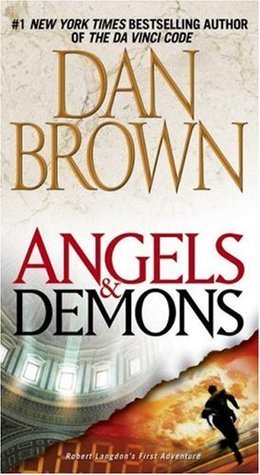 Angels & Demons
Angels & Demons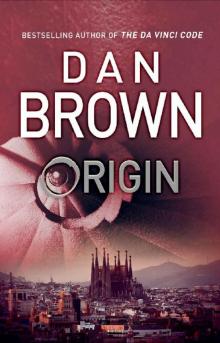 Origin
Origin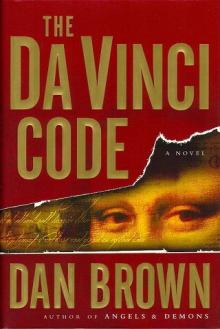 The Da Vinci Code
The Da Vinci Code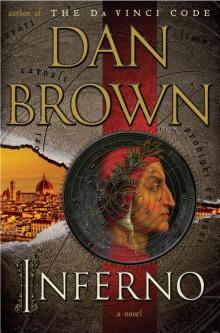 Inferno
Inferno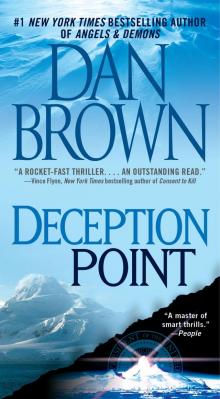 Deception Point
Deception Point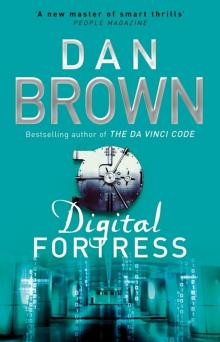 Digital Fortress
Digital Fortress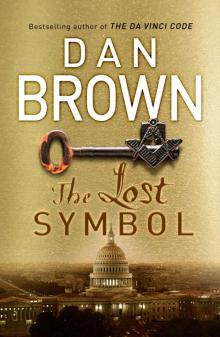 The Lost Symbol
The Lost Symbol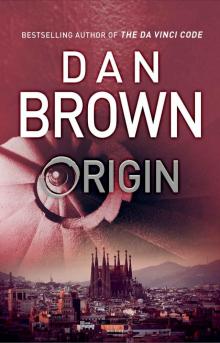 Origin: (Robert Langdon Book 5)
Origin: (Robert Langdon Book 5)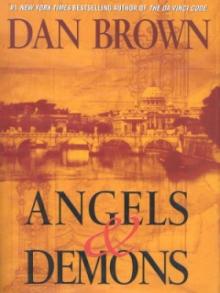 Angles & Demons
Angles & Demons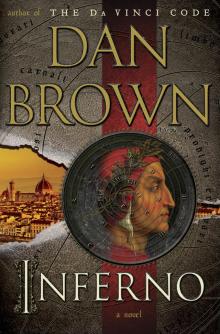 Inferno: A Novel
Inferno: A Novel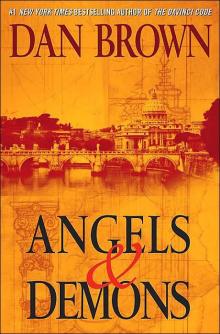 Angels & Demons rl-1
Angels & Demons rl-1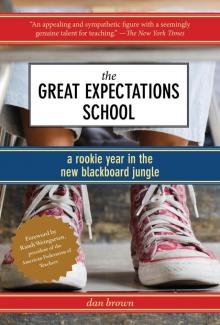 The Great Expectations School
The Great Expectations School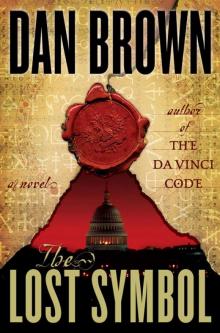 The Lost Symbol rl-3
The Lost Symbol rl-3 Angels and Demons
Angels and Demons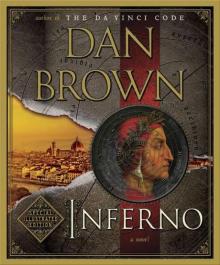 Inferno: Special Illustrated Edition: Featuring Robert Langdon
Inferno: Special Illustrated Edition: Featuring Robert Langdon